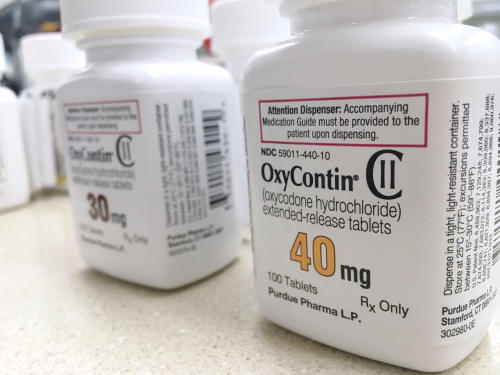
Two prominent members of the founding family of Purdue Pharma appeared before Congress Thursday and continued to distance themselves from an aggressive marketing campaign the company allegedly used to drive sales of the dangerous opioid painkiller, OxyContin.
Kathe Sackler and David Sackler appeared by video along with Purdue President and CEO Craig Landau for a morning-long grilling by the U.S. House Committee on Oversight and Reform. The Sacklers served on the board of Purdue until 2018 and were taken to task in bipartisan fashion Thursday over their role in the tragic boom in OxyContin sales and their alleged efforts to protect the proceeds from potential future fines and litigation.
“Those profits should be clawed back,” said Chairwoman Carolyn B. Maloney (D-NY), who later characterized the billionaire Sackler clan as “the Bernie Madoffs of medicine.”
The Sacklers portrayed themselves and the rest of the Purdue board as being largely out of the loop in terms of the details of sales strategies that were developed by lower-ranking executives. “I would be happy to apologize to the American people,” Kathe Sackler told the committee. “I am also very angry that some people who worked at Purdue broke the law.”
Unlike the notorious convicted swindler Madoff, the Sacklers have not been charged criminally with any wrongdoing; however, the family has agreed to pay $225 million in a deal with the U.S. Department of Justice to settle civil claims in which they did not have to admit wrongdoing.
Purdue has also been slammed with financial penalties over the nationwide opioid addiction epidemic that is blamed for around 450,000 to as many as 500,000 deaths in the two decades since OxyContin hit the market as a painkiller. The company last month pleaded guilty to criminal charges including paying kickbacks to doctors to write copious prescriptions for OxyContin. Purdue is currently seeking approval from a bankruptcy court for a plan in which the federal government would forego much of an estimated $2 billion forfeiture.
In addition, the Sackler family has agreed to pay $225 million in a deal with the U.S. Department of Justice to settle civil claims in which they did not have to admit liability.
Critics of the proposed plan contend the Sacklers were enriched to the tune of $10 billion from OxyContin sales, and that the Purdue board’s response to growing evidence that the drug was far more addictive than advertised was to push even harder for increased OxyContin sales and to transfer large amounts of cash from the company to the Sacklers, allegedly so it would not be gobbled up by an anticipated surge of lawsuits.
The Sacklers, however, said Wednesday that nothing improper had been done on their part and that a settlement reached in 2007 by a Purdue affiliate company over OxyContin was not the trigger for the lucrative disbursements the family received beginning the following year. “I don’t believe anyone knew that the lawsuits that began in 2017 were coming,” David Sackler said.
They also insisted that the board did not condone the alleged hard-sell tactics Purdue used to keep physicians writing more and more prescriptions for the addictive opioid, which earned around $30 billion for Purdue over the years. “That was not my goal and I do not recall that being the goal of the board of directors,” Kathe Sackler said. “As a director, I would not know about the details of the goals of the sales department.”
Landau, an anesthesiologist who became president and CEO in June 2017, testified that prior to his promotion, he was focused on research-and-development at Purdue and wasn’t privy to what was going on in the sales and marketing departments. He did note that the addictive nature of OxyContin was known to the FDA and that it had been up to physicians who were the “gatekeepers to OxyContin prescriptions,” to determine which patients received the drug. “We know the vast majority of medicines that end up in the wrong hands, often come from friends or a family member who may be a legitimate patient,” he said.
The testimony did not appear to sway any of the committee members from either party from the idea that the Sacklers had not yet satisfied a debt to society for OxyContin’s role in the overall opioid epidemic. U.S. Rep. Clay Higgins (R-LA), a former police officer, expressed dismay that Purdue’s board could be ignorant of alarming reports from “the street” that OxyContin was indeed highly addictive and that his fellow cops would flatly refuse to take it while recovering from on-the-job injuries.
U.S. Rep. James Comer (R-KY), the ranking Republican on the panel, said, “There is no one in Congress more business-friendly than I am… but you are bad actors and there is no excuse for what you did.”




